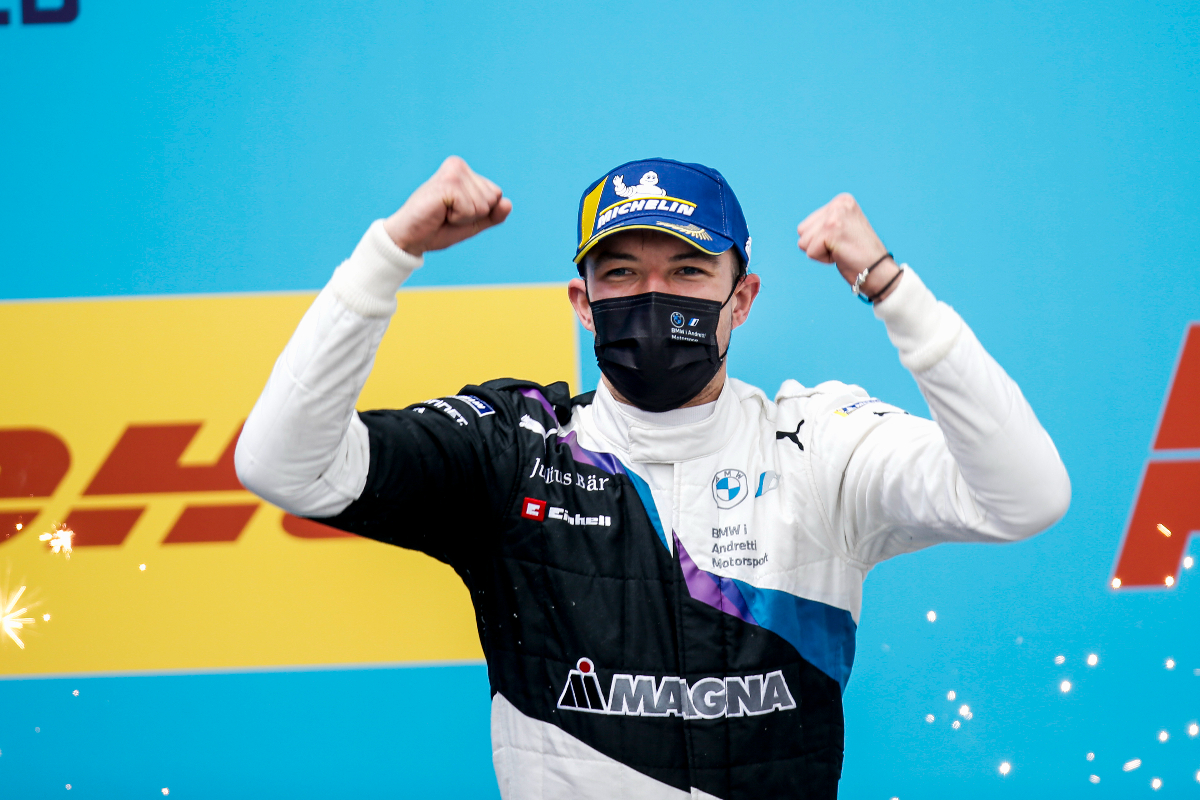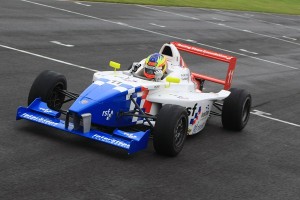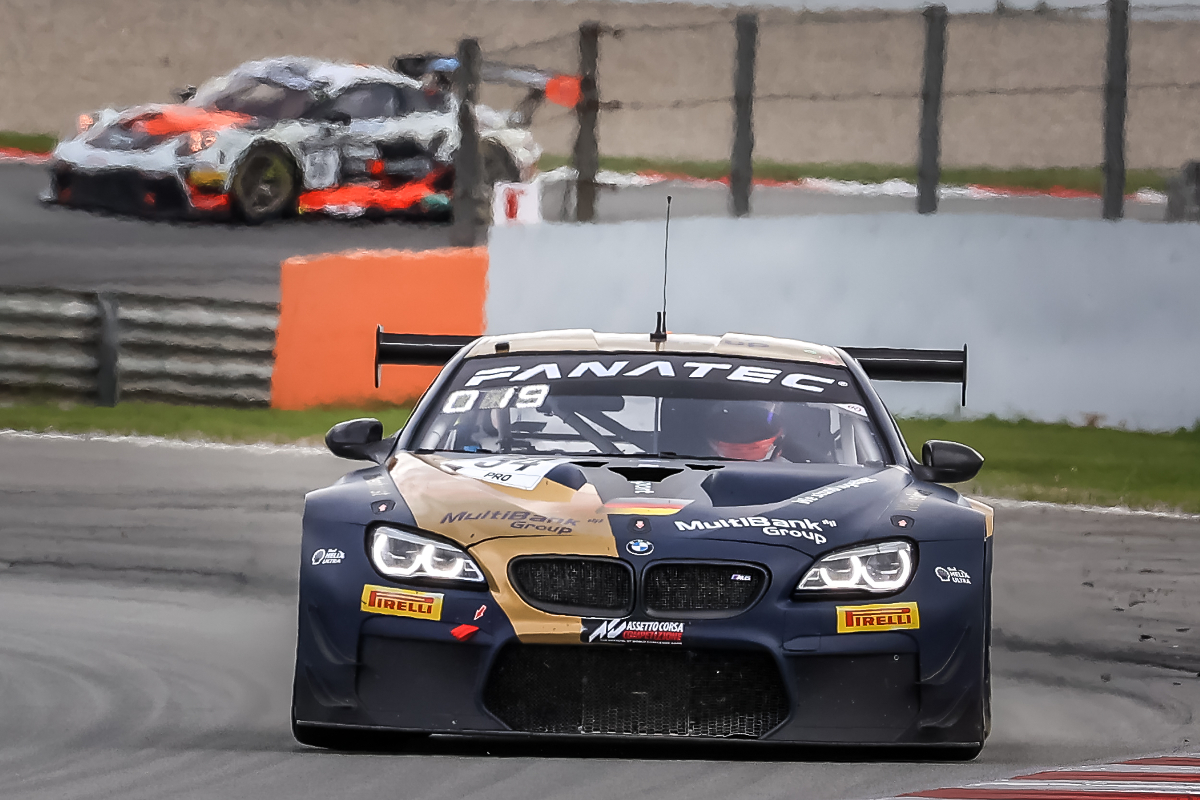
Photos: FIA Formula E
Jake Dennis surprised on his single-seater return by fighting for the Formula E title, but the rookie showed before moving to sportscars that he had the potential to go all the way to the top of open-wheel racing
The British driver has come a long way since he started racing cars more than a decade ago. Dennis was one of the best karters about before then, and once he stepped into junior single-seaters he had an immediate winning start. He spent five-and-a-half years chasing the Formula 1 dream before applying his skills to sportscars for the next five, and during that time he tested an F1 car on three different occassions.
In 2021 he decided to come back to single-seaters, which was “a bit of a shock for everyone” after several years of GT racing. Formula Scout had the chance to catch up with him on every aspect of his racing portfolio during the last GT World Challenge Europe round at Barcelona.
Also find the podcast on Breaker, Google Podcasts, Overcast, Pocket Casts, RadioPublic, Castbox, Apple Podcasts and Spotify.
Jake Dennis’ motorsports career started in karting back in 2003. His talent didn’t go unnoticed as aged 13 he was selected to join Graham Sharp and Derek Walters’ Racing Steps Foundation young driver support scheme, and then aged 15 he won the CIK-FIA Under 18 World Karting Championship in 2010.

Photo: Jakob Ebrey Photography/RSF
That success prompted a move into single-seaters when he was still 15, and he was able to do so in the Formula BMW-based InterSteps championship in Britain. He won his first two races, then added another six victories to clinch the title. He then contested the final ever edition of Formula Renault 2.0 UK’s winter series to warm up for a very different experience in 2012.
“This was my first real experience of racing on proper European circuits, so Formula 1 circuits. It was a big difference compared to the UK,” Dennis explained to Formula Scout. “I went from racing in the UK with maybe 15 cars [on the grid] to then having 35 or 37 FR2.0 cars on track at the same time. Just the whole experience of qualifying and then having proper races, there was a lot to learn.”
However, he claimed the Northern European Cup title, placing himself in contention for the Autosport BRDC Award which at that point in time was sponsored by McLaren.
“There was a lot of pressure on me to try and win the McLaren Autosport award. The other finalists were also drivers that came from the FR2.0 championship. There was six of us at the time, and four of us raced in FR2.0.”
Indy Pro 2000 champion Jack Hawksworth, FR2.0 Eurocup racer Melville McKee, FR2.0 BARC runner-up Josh Webster and Dennis’s FR2.0 NEC title rivals Jordan King and Josh Hill were the finalists to beat.
“I think it was just not expected of me to win it, but just because I beat them in FR2.0, I put a lot of pressure on myself to try to beat them again in completely equal level fields,” Dennis recalled.
“Oliver Rowland, who was also sponsored by Racing Steps Foundation at the time, won it the year before I did. So, there was extra pressure because an RSF driver had won it one year before I did it, and then it was sort of like my turn to try to win it.
“I was confident, but you obviously always have that doubt in your mind if you did a good enough job and then on the night, when they announced the winner at the Autosport Awards, they said my name.
 “I managed to win it and it was such a cool feeling like to go up on the stage with all the confetti in front of everyone. It is the main award of the night, and everyone is there to listen and hear who this young up-and-coming driver is. It’s a memory which I definitely won’t forget, and it’s still at the front of my mind how the whole night went.”
“I managed to win it and it was such a cool feeling like to go up on the stage with all the confetti in front of everyone. It is the main award of the night, and everyone is there to listen and hear who this young up-and-coming driver is. It’s a memory which I definitely won’t forget, and it’s still at the front of my mind how the whole night went.”
Dennis recalled with joy the experience of winning one of the most prestigious awards in motorsport, but also the main prize it offers. The McLaren F1 test is something that definitely stays in the winner’s mind for years.
“It’s such an experience to drive a F1 car so young. I was 17 at the time. It’s your first real eye-opener of what a F1 car can do and your first real experience of a proper race car because even in FR2.0 the cars are still quite pure [without electronics]. It’s not the highest level in terms of like downforce or power. And then you’re driving a F1 car at Silverstone with McLaren.
“It was a big step. You don’t have a massive amount of time to get up to speed. You just sort of jump in and try to get as much experience as you can, but it was one of my best memories in motorsport for sure.”
After that Dennis spent another season in the FR2.0 Eurocup, but failed to win, and he departed Fortec Motorsports’ ranks after three years together to move up to the FIA European Formula 3 championship with Carlin. He struggled as a rookie, but a move to the dominant Prema for 2015 helped him finish third in the standings, ahead of five future F1 drivers. That season he was team-mates with F3 veteran Felix Rosenqvist, who taught him a very important lesson.
“Felix is not super driven by what is said on the computer screen. He just jumps in the race car and drives. That taught me a lot, and I definitely took that mentality forward with me and made myself more of a driver which is just fluid and easy-going. Like I don’t have to look at the data for hours and hours to try to improve myself.”
The following step in Dennis’s career was to GP3 with Arden, and an introduction to Pirelli tyres. Dennis, as well as many other drivers have done, highlighted the importance of managing them correctly.

Photo: Zak Mauger/GP3 Series Media Service
“We went from the Hankook tyre which is very robust, you can push on the tyre for the whole race, you can go flat out and have no issues. Whereas in GP3, the Pirelli was super soft at the time. There was a lot of tyre degradation, so we had to learn this whole new technique of driving, which was a challenge.
“I think the Arden race-car package was probably one of the best of the grid, and whenever there was high degradation we would always perform very well. We would come through the field one or two seconds a lap faster than everyone.”
Proof of that statement is in races like the Spa-Francorchamps. That afternoon Dennis came through the field with a blistering pace to finish second after starting 13th. But performances like that were too rare for a maintained title attack.
“We won some races that year, but it was a difficult year. At the start, I think I was 10th in the championship after the first three rounds. I finished fourth in the end, and we scored the most points out of everyone from round four onwards. But the damage was done. We were out the title battle from round three or four. We were too far back.”
At this point of his career, Dennis had to make a crucial decision, and he doesn’t regret what he chose.
“This was probably the most crucial part of my career because I was still sponsored at the time by RSF, and it was just a stage of like do we try to push for Formula 2 or do we try to move to sportscars and earn a career, trying to start earning a living out of motorsport.
“It was difficult to leave my F1 dream behind, but I don’t regret it at all. I’m now sitting here as a BMW factory driver and a Formula E driver, so it has paid off. I am a professional driver, so it’s a decision I am glad I made.”
Since 2016, he has spent several years in GT3, something he “loves” to do, but also contesting occasional prototype sportscar races and even doing a season of the DTM during its Class One era. However, a shocking move, as Dennis himself described it, was being prepared for 2021.

Photo: SRO/Patrick Hecq Photography
“There was a lot of work going on in the background. My management at the time was working hard to try to make it happen. We did a simulator test with BMW, and then I moved into an actual proper test against Max Gunther, who went on to be my team-mate [in FE].
“It was basically ‘let’s see how fast you can drive this car’. I took the opportunity with both hands, trying to do the best job I could. And then about three weeks later I got the call to say I would be getting the seat.
“I got announced [by BMW Andretti], and everyone was like ‘oh my god, I can’t believe it’. That was a cool experience.
“But, for me, it was a super challenging transition back to single-seaters. Especially with FE which is not a car where you just jump in and drive naturally. There are so many different things with the software, the way you drive the car, which really demands a different style of driving.
“Getting my head around this was a challenge, but also something I enjoyed and eventually I started to get pretty good at and to understand what was needed, and then I ended up having successful first year in FE,” he said.
The beginning of the season wasn’t easy for Dennis, as he failed to score points in the first two rounds. In fact, Formula Scout understood at the time that Andretti was already scouting for a replacement driver for the next season.
However it all changed when the championship landed in Valencia, where the official pre-season test had taken place. Dennis claimed an astonishing win from pole, leading all the way at a track where everybody said nobody wanted to be doing that. He picked up a second win on home turn in London, and became the most successful rookie in FE history.
These wins were key to his third place in the standings, just eight points off a crown that could have been his had the rear axle not locked up in a technical failure and caused him to crash out out of the title-deciding race.
 He might not have achieved it this time, but Dennis managed to secure his Andretti seat for a second season and is determined to become FE world champion if he gets the chance to fight at the front again.
He might not have achieved it this time, but Dennis managed to secure his Andretti seat for a second season and is determined to become FE world champion if he gets the chance to fight at the front again.
“I want to try to become FE champion at some point. Whether that can happen next year or the year after I don’t know. But I would really like to try to succeed fully in FE,” he stated.
The electric championship has now become his priority, but he will also keep racing for BMW in endurance racing. In that regard, his sights are on Daytona 24 Hours, a race he could do in GTs or the new LMDh category if the opportunity arises.
“I think my last bucket list racetrack is Daytona. This is the one which still stands out to me. It is one I want to do. I think I’ve done all of the others. So, if I can try and do this race in the M4 GT3 or whether it’s the LMDh, I really don’t know. But it’s the last track I really want to do in my career and hopefully I can do it before I retire, which is in hopefully many years.”
There’s one more facet to Dennis’s motorsport career, and it could net him a world championship in the series he originally aimed for.
Since 2014, he has combined his own racing duties with a F1 simulator and development driver role, first at Williams and then at Red Bull. This job gave him the chance of driving the wheel of the RB16 in the in-season rookie tests of 2019.
Dennis explained how he got the Red Bull gig, and his previously secret Williams role.
“One of my friends was quite good friends with Christian Horner, and I was working for Williams at the time doing simulator work for about two or three seasons as well. And there was an opportunity which came up at Red Bull because they needed another simulator driver.
 “So, we just did all the assessments, it is like three or four assessments which you have to go through to then get the job. I ticked off, take them off one by one, and if you are good enough and meet the criteria, then you get the job.
“So, we just did all the assessments, it is like three or four assessments which you have to go through to then get the job. I ticked off, take them off one by one, and if you are good enough and meet the criteria, then you get the job.
“It worked out at a good time for me. I was obviously quite a bit more experienced than I was when I was at Williams, so it was a good step forward and led to some F1 testing, which was a pleasant surprise. It wasn’t really needed in terms of my career, like I didn’t ever see myself moving back to F1. My goal was GTs at that point. I was a full-time GT driver. I knew my F1 career was over by that point, so it was just a nice way to enjoy a F1 car with no real pressure and no real expectations.”
The experience of driving for Red Bull, which he did twice in official tests in 2019, left Dennis starstruck at the engineering.
“The amount of downforce these cars can produce in this era is just incredible, and being able to experience that’s something that I will never forget. I really don’t think, the way F1 is going at the moment, the cars will ever be this fast ever again.
“And it’s nice to say that, even for me and [fellow BMW driver and Aston Martin F1 tester] Nick Yelloly, we have probably driven the fastest F1 cars ever made. We are not F1 drivers, but it is a cool thing to say. It’s a great experience to have, just to take to your grave. When we are old and grey, we can say that we have driven the fastest ever hand-made machines.”
Further reading on Formula E stars
Catching up with motorsport’s only European and World Cup winner
Why FE is a whole new ball game for single-seater stars
Jean-Eric Vergne: The JEV-demption
